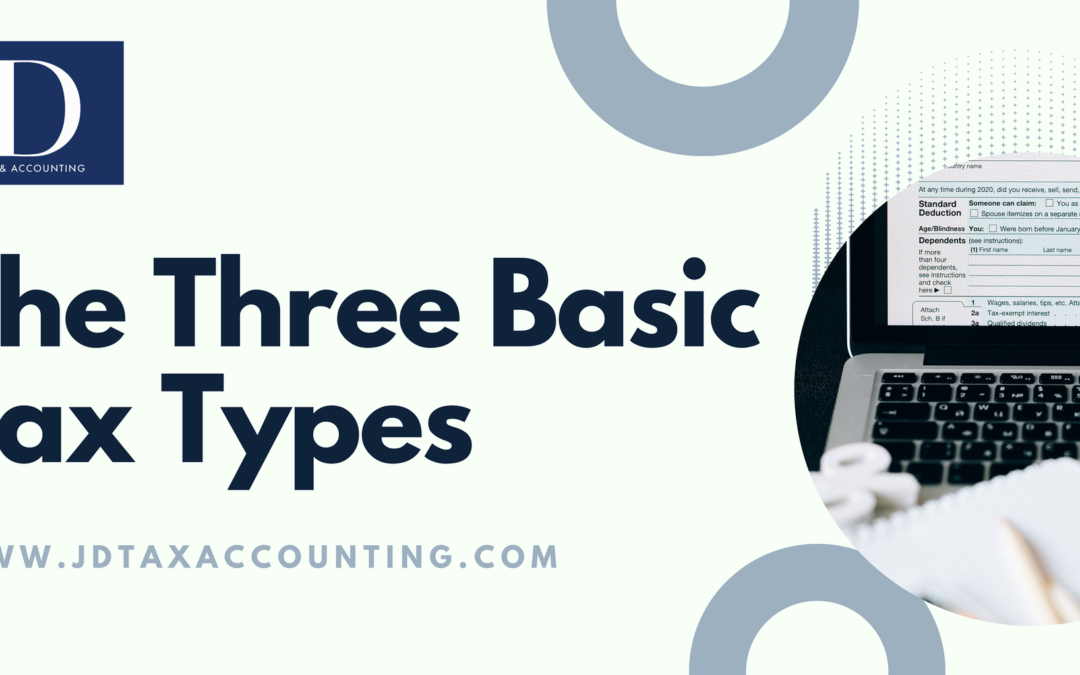What are Taxes?
Taxes are the liability or total amount of money an individual, corporation, or another entity owes from a taxing authority, which the government uses for support or projects of specific entities and services.
It’s pretty simple. Taxes are divided into three types.
- Taxes on what you EARN
- Taxes on what you BUY
- Taxes on what you OWN
First Type: Taxes On What You Earn
There are five (5) major kinds of taxes under this type:
- Capital Gains Taxes
When you own assets like stocks and real estate and their value increase over time, you have unrealized capital gains. After you sell it, you have realized Capital Gains. You are required to pay tax on realized Capital Gains.
For tax purposes, short-term capital gains are treated as ordinary income on assets held for one year or less. Long-term capital gains are set at 0%, 15%, or 20%, depending on your income level.
- Payroll Taxes
Payroll Taxes are taxes paid on the wages and salaries of employees. You can look at your paystub or W-2 to see the amount of taxes withheld from your pay. The tax is imposed and collected to help finance social security programs like Medicare.
- Corporate Income Taxes
Corporate Income Taxes are just for C-Corporations. It is the tax paid on the profits of the corporation. S-Corporations are pass-through entities. The income from an S-Corp is passed to the shareholders, where they pay tax on their individual tax returns.
- Individual Income Taxes
In the U.S, we have a progressive tax system which means your tax rate will rise with your income. This is because your income includes earnings from all sources, whether it’s in the form of services, money, or property.
Second Type: Taxes On What You Buy
- Excise Tax
Also known as “sin” taxes, this kind of tax is realized and strictly implemented to compensate for the externalities or harmful side effects of purchasing a good or service. The most common examples of these goods and services are cigarettes, soda, gasoline, and alcohol.
- Value-Added Taxes
This tax is the consumption tax for the final stage of the production chain. Therefore, this type of system that only allows payment of taxes in the final stage of the production process helps the inability to tax pyramiding.
- Gross Receipt Taxes
A tax obligation on businesses levied on their gross sales, without reductions and regardless of profitability. Unlike other business taxes, this tax is a heavy burden for most companies, especially start-ups, since it requires taxes on each stage of the production chain or tax pyramiding.
- Sales Taxes
This tax is realized when a buyer buys the good or service. Typically, you pay sales taxes for every good you purchase or service you acquire. It can be seen in receipts and may differ depending on the store where you are buying.
Third Type: Taxes On What You Own
- Wealth Taxes
This tax is levied on an individual’s annual net wealth, computed by subtracting their liabilities from their assets. Recently, U.S. politicians such as Elizabeth Warren have proposed adding a wealth tax to Close the Wealth Gap.
- Estate and Inheritance Taxes
Estate Taxes are imposed on one’s net worth after he passes away. The estate pays the estate tax, and the heirs pay the inheritance tax, together with a ‘gift tax,’ to help secure the transferring of the properties before death.
- Tangible Personal Property (TPP) Taxes
TPP Taxes are levied on any property that can be seen, touched, or moved, such as machinery and equipment. This type of tax is quite burdensome for many individuals and businesses and has an abysmal share of the total tax collected.
- Property Taxes
If TPP Taxes are realized on movable properties, ‘Property Tax’ is realized on immovable properties, such as lands and buildings. This is one of the most commonly known types of tax and one of the essential sources of revenue for U.S. states and local governments.
References
Tax Foundation. (N.D.). Types of Taxes: The Three Basic Tax Types. Retrieved July 15, 2021, from https://taxfoundation.org/the-three-basic-tax-types/


